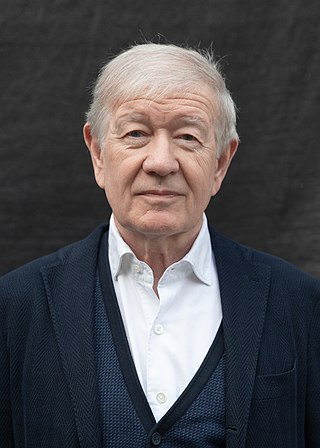Related Research Articles

dpa Deutsche Presse-Agentur GmbH is a German news agency founded in 1949. Based in Hamburg, it has grown to be a major worldwide operation serving print media, radio, television, online, mobile phones, and national news agencies. News is available in seven languages, among them German, English, Spanish and Arabic.

Wiener Zeitung is an Austrian newspaper. First published as the Wiennerisches Diarium in 1703, it is one of the oldest newspapers in the world. Until April 2023, it was the official gazette of the government of the Republic of Austria for legally-required announcements, such as company registrations and was also the official publishing body for laws and executive orders until 2004.

Profil, is an Austrian weekly news magazine published in German and based in Vienna. It has been in circulation since 1970. The magazine is sometimes considered the Austrian counterpart to Der Spiegel.

Michael Fleischhacker is an Austrian journalist. He was director and editor-in-chief of Austrian daily Die Presse from 2004 until 2012.

Königrufen or Königsrufen is a four-player, trick-taking card game of the tarot family, played in Austria and Southern Tyrol, with variants for two, three and six players. As with other regional tarot card games, it is usually called Tarock by its players. It is the only variant of Tarock that is played over most of Austria and, in 2001, was the most popular card game in Austria after Schnapsen and Rommé. By 2015, it had become "the favourite card game of Austrians". It has been described as the most interesting tarot game for four players, the "Game of Kings", a game that requires intelligence and, with 22 trumps in play, as good "training for the brain".

Tarot games are card games played with tarot packs designed for card play and which have a permanent trump suit alongside the usual four card suits. The games and packs which English-speakers call by the French name tarot are called tarocchi in the original Italian, Tarock in German and similar words in other languages.
News is an Austrian weekly news magazine published in German and based in Vienna, Austria. The weekly is the major news magazine in the country and has been in circulation since October 1992.

Tapp Tarock, also called Viennese Tappen, Tappen or Tapper, is a three-player tarot card game which traditionally uses the 54-card Industrie und Glück deck. Before the Anschluss (1938), it was the preferred card game of Viennese coffee houses, for example, the Literatencafés and Café Central. Even today Tapp Tarock is played sporadically. The exact date when it appeared is not possible to identify; some sources suggest it may have been developed in Austria in the early 19th century, but its mention in caricature operas in 1800 and 1806 suggest it was well known even by then and must have arisen in the late 18th century. The oldest description of the actual rules is dated to 1821. Tapp Tarock is considered a good entry level game before players attempt more complex Tarock forms like Cego, Illustrated Tarock or Königrufen.

Neunzehnerrufen is an Austrian card game of the Tarock (tarot) family for four players. Under the name Taroky or Czech Taroky it is the national Tarock variant of the Czech Republic and Slovakia, but - with certain variations – is also played in parts of the Austrian states of Upper Austria, Lower Austria and the Styria as well as in Poland south of the River Vistula.

Strohmandeln, also called Strohmandel, Strohmanntarock, Strohmanntarok, Zweiertarock, Strawman Tarock or Straw Man Tarock, is an old, two-hand card game from the Austrian branch of the Tarock family. It takes its name from the three-packet talon of four cards, the Strohmänner ("strawmen"), each player has at the start of the game. While the original game has been described as jejune, it was eventually superseded by an attractive successor which is both challenging and very exciting.

Illustrated Tarock or Illustrated Dreiertarock is an Austrian card game that has been described as the "queen" of all three-handed Tarock games played with the 54-card pack. It was thought by Mayr and Sedlaczek to be extinct but, in 2009 when the two Tarock authors were guests on an ORF radio programme, players from Vienna called in who confirmed they still played the game. It is sometimes called Point Tarock which, however, is a different, probably extinct, game, albeit a close cousin. Although it has "a reputation for being a little more convoluted than the others", Furr maintains that this is not so, but recommends that players become familiar with Tapp Tarock before attempting this game.

Point Tarock was a three-player tarot card game, played mainly in Austria, which used the 54-card Industrie und Glück deck. It is probably extinct. Furr describes it as being "identical to Tapp but for the addition of a special announcement, allowing a Declarer to capitalize on a very good hand... spicing up the game considerably." Point Tarock is sometimes confused with its close cousin, Illustrated Tarock.

A blank is a playing card in card-point games that is a non-counter, or is worth nothing. In Poker, the term refers to a community card which is extremely unlikely to help any remaining player.

Dreiertarock is a 3-handed card game of the Austrian Tarock family. Although less popular than it once was, it is still played in Austria, especially in Carinthia, and in neighboring Slovenia. In 2013, it was one of five variants of Tarock game competed for in the International Piatnik Tarock Tournament in Vienna. For a long time, three-handed variants of Tarock were played alongside the four-handed games and were very popular everywhere in Austria. They have since fallen behind in popularity which "is a pity because they are interesting variants which demand a high level of skill". They remain popular in Slovenia.

Kosakeln ("Cossack") is a relatively recent, two-hand card game of the Austrian branch of the Tarock family. It is a two-handed version of the three-player game of Illustrated Tarock, itself an elaborate and challenging variant of Tapp Tarock.

Husarln ("Hussar") is a mid-20th century, three-hand card game of the Austrian branch of the Tarot family. It is a 42-card variant of Illustrated Tarock and appears to be a close Austrian relative of the 42-card Hungarian tarock card games. The game is dominated by the distribution of Tarocks, giving it a "brisk and energetic feel" that is reflected in its name. It is also known as Block Tarock, although that name was given to a quite different and older game.

Robert Sedlaczek is an Austrian journalist, Germanist and non-fiction author. He is best known for his works on aspects of the German language. In addition, he writes books and articles on cultural history topics. In his book Die Tante Jolesch und ihre Zeit. Eine Recherche he traced the history of the industrial family of the same name as well as the lawyer, Hugo Sperber. These people are characters in Friedrich Torberg's book Die Tante Jolesch.

Armin Thurnher is an Austrian journalist. He is publisher and editor-in-chief of the Viennese city newspaper Falter.
Emil Löbl was an Austrian writer and journalist.

Richard Grasl is an Austrian journalist and media manager. Among other things, he was editor-in-chief of the Austrian Broadcasting Corporation ORF Studios Lower Austria (2002–2009) and commercial director of the Austrian Broadcasting Corporation (2009–2016). He has been a member of the Kurier editor-in-chief since November 2018 and deputy editor-in-chief since January 2021.
References
- 1 2 3 Früherer APA-Chefredakteur Wolfgang Mayr feiert 70. Geburtstag. tt.com, 10 Juni 2014. Retrieved 5 March 2020.
- 1 2 Ein Leben in der APA: Chefredakteur Mayr geht in Pension. APA-OTS, 6 July 2005. Retrieved 21 February 2018.